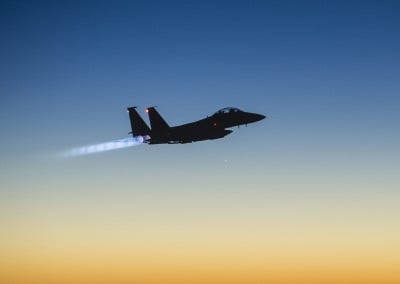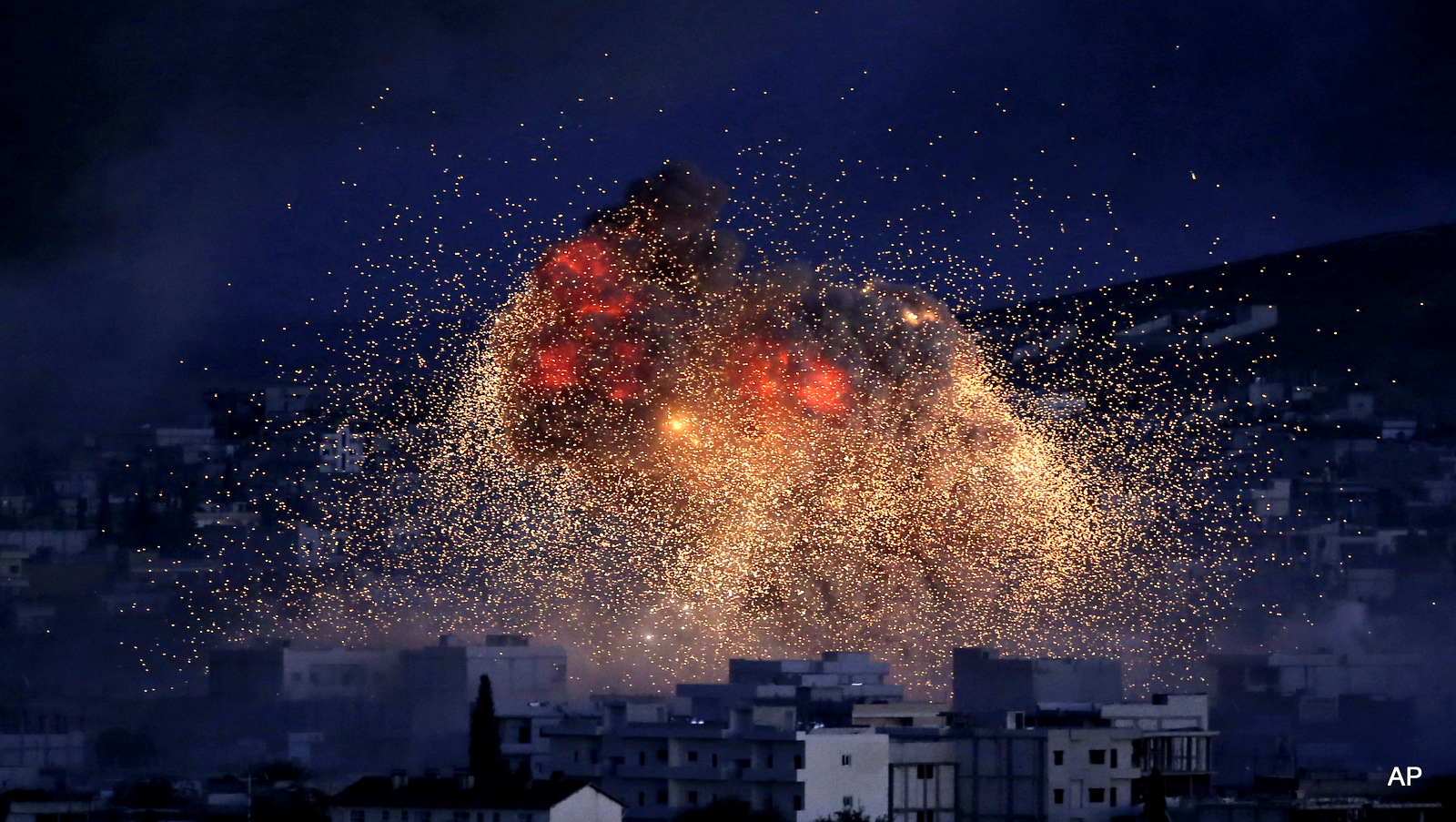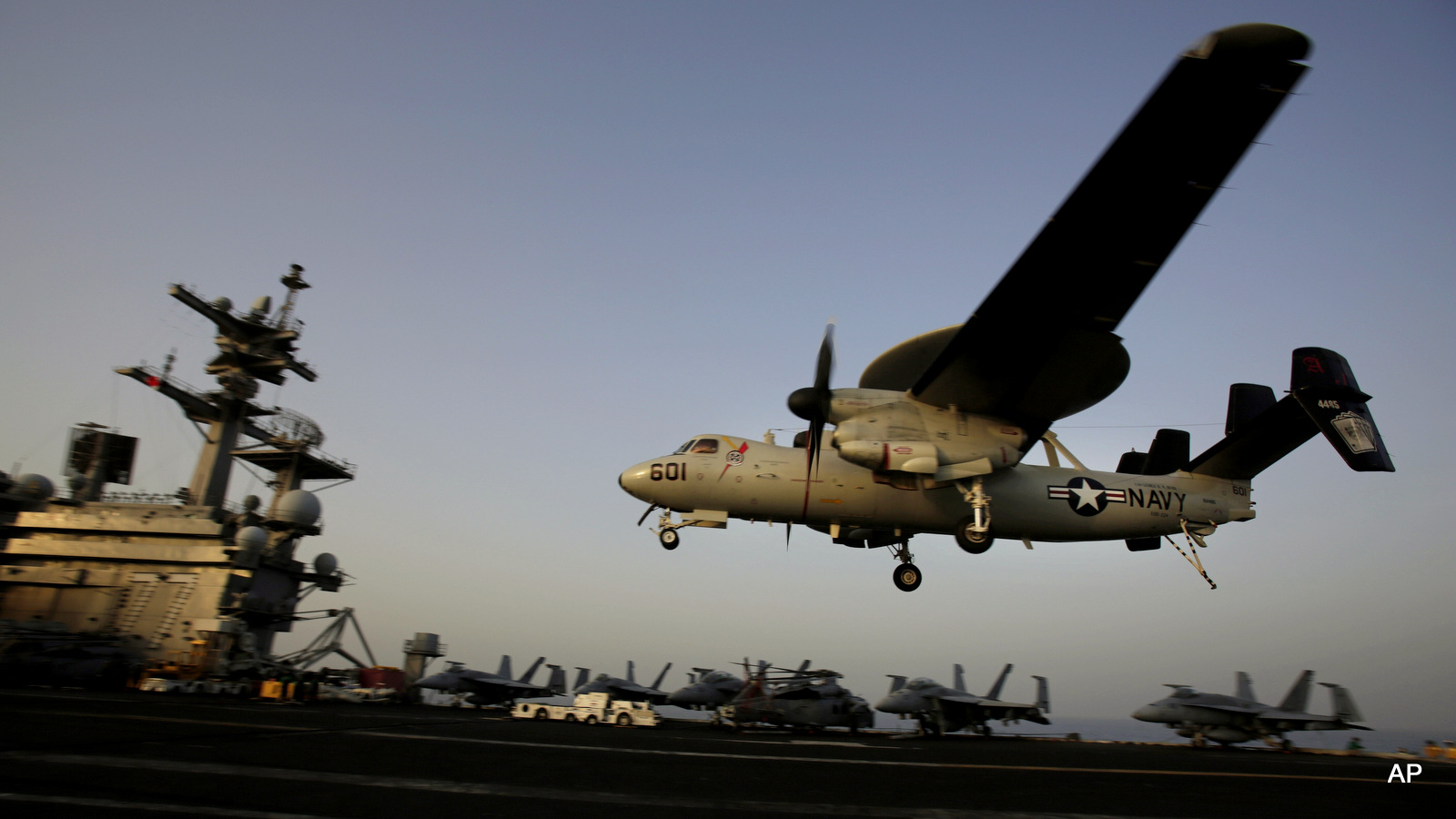US-Backed Coalition Has Dropped 54,611 Bombs in 15,362 Airstrikes in the War on ISIS

‘We have to knock the hell out of ISIS, and we have to do it fast,’ Donald Trump urged in the first presidential debate, but after almost 55,000 bombs it might be time for a new strategy.
Despite dropping 54,611 bombs and missiles in 15,362 airstrikes across the Middle East, the U.S.-backed coalition seems no closer to stamping out terrorism than when it began.
That figure comes from Airwars, a nonprofit that keeps track of the aerial campaign against Daesh (an Arabic acronym for the terrorist group commonly known in the West as ISIS or ISIL) and other groups in Iraq, Syria and Libya.
Since the air war on Daesh began on Aug. 8, 2014, the U.S.-backed coalition has carried out 9,996 airstrikes in Iraq and 5,366 airstrikes in Syria.

Thick smoke and flames erupt from an airstrike by the U.S.-led coalition in Kobani, Syria, as seen from a hilltop on the outskirts of Suruc, at the Turkey-Syria border.
Airwars also attempts to track all civilian casualties caused by the U.S.-backed coalition and Russian bombs. These figures are unreliable, as official government sources routinely underestimate the number of civilians killed while generously inflating the numbers of combatants killed. To combat this bias, the NGO uses eyewitness accounts and local media to more accurately report on the civilian death toll.
According to the most recent report on the site, between three and seven civilians were killed, and 47 were injured in airstrikes carried out by the coalition on Mosul in northern Iraq during the early morning hours of Sept. 21. In a translation from a video published by NRN, a local Arabic-language news source, one eyewitness suggests the high body count from the airstrikes makes the coalition look even more brutal than Daesh:
When you see this bombing no one can blame Islamic State when they kill a spy with a bullet to his head. Innocent family members were killed by this bombing.
Airwars estimates that at least 1,612 civilians have been killed by the U.S.-backed coalition since 2014, though that figure could be as high as 2,437.

An aircraft lands after missions targeting the ISIS in Iraq from the deck of the U.S. Navy aircraft carrier USS George H.W. Bush in the Persian Gulf. For weapons manufacturers, the nonstop pace of airstrikes targeting ISIS fighters in Iraq and Syria, as well as Saudi-led bombing of Yemen’s Shiite rebels and their allies, means billions of dollars more in sales.
Despite the loss of Fallujah, which was declared “liberated” from the terrorists in June, Daesh maintains a strong presence in Syria and Iraq, and continues to take credit for terrorist attacks abroad.
Mosul, currently under heavy bombardment by the coalition, is forecast to be the next target for Iraqi forces. In a Sept. 17 report from Politico, retired U.S. Army Col. Daniel L. Davis quoted a Kurdish commander who estimated there are still some 20,000 Daesh troops in and around Mosul, suggesting that even a victory in Mosul could be short-lived. Military experts Davis interviewed speculated that retaking the city from Daesh could trigger a new Iraqi civil war similar to the current conflict in Syria.
The air war began over two years ago under President Barack Obama, but both Hillary Clinton and Donald Trump have indicated that they intend to intensify the conflict against Daesh.
During Monday’s presidential debate Clinton said:
We’re working with NATO, the longest military alliance in the history of the world, to really turn our attention to terrorism. We’re working with our friends in the Middle East, many of which, as you know, are Muslim-majority nations.
In his response, Trump noted:
I think we have to get NATO to go into the Middle East with us, in addition to surrounding nations, and we have to knock the hell out of ISIS, and we have to do it fast, when ISIS formed in this vacuum created by Barack Obama and Secretary Clinton.
Responding to the candidates on Tuesday, Robert Fisk, an award-winning journalist who covers the Middle East for the Independent, expressed frustration at both candidates’ eagerness to continue the same, failing strategies. He wrote:
[H]aven’t we all been knocking the hell out of Afghanistan, Iraq, Yemen, Syria, even Lebanon (a few years ago), and achieving the constant rebirth of ever more vicious warriors, of which Isis – heaven spare us the thought – may soon generate another, even worse progeny?
Fisk, who is based in Beirut, also noted that Washington’s so-called “friends” in the Middle East include “[t]hose fantastic Saudis who gave us 15 of the 9/11 hijackers,” and suggested it will be America’s fault when the air war on Daesh inevitably creates more terrorism through blowback.
He concluded:
About the only nonsense left unuttered by Trump and Clinton was that Isis was born outside the United States. There they would have been on safe ground. Or would they? For I suspect there may be a growing number of Arabs who believe that Isis is indeed a child born in America.

